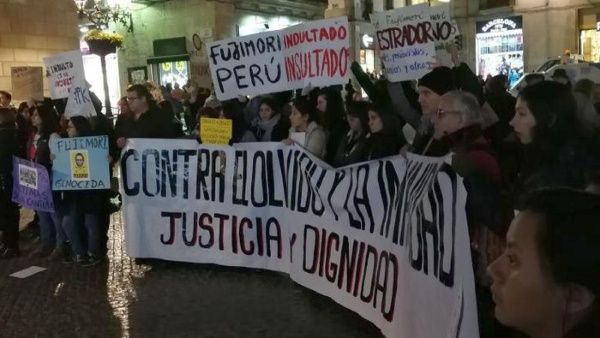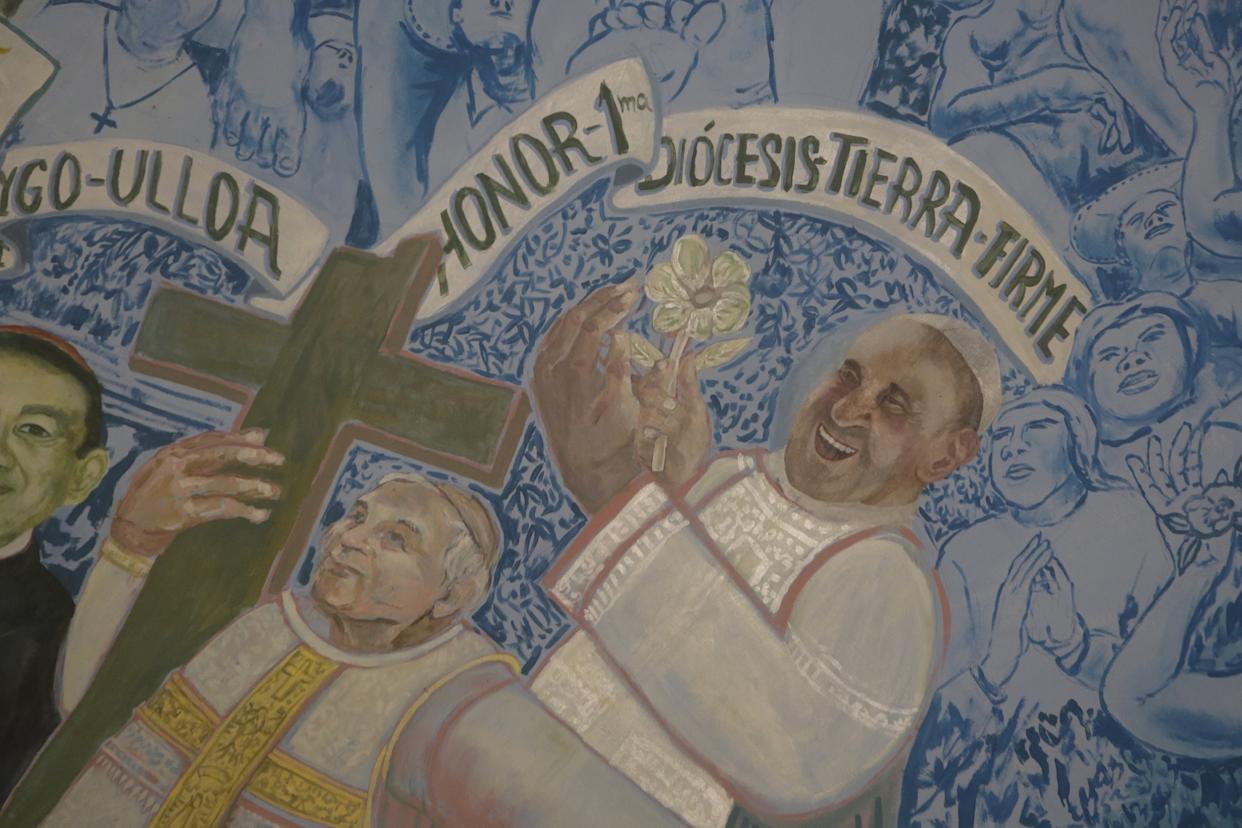International
Trial of former president Fujimori for massacre begins in Peru

December 19 |
The trial against former Peruvian president Alberto Fujimori, his former advisor Vladimiro Montesinos and 21 others investigated for the crime of aggravated homicide in the Pativilca massacre case began this Monday, according to local judicial sources.
According to the information, the hearing will be in charge of the Fourth National Superior Criminal Court.
At the beginning of the trial, Public Prosecutor Elsa Delgado Pérez stated that former president Alberto Fujimori (1990-2000) implemented an anti-terrorist policy that consisted of “eliminating presumed terrorist elements” through operations carried out by the Colina undercover detachment.
The Public Prosecutor explained that Fujimori developed this national policy with the issuance of new laws and the organization of the National Intelligence Service (SIN), through which he ordered special intelligence operations related to the fight against terrorism in the country.
“One of those operations was carried out by the Colina detachment,” which “assassinated six residents” of Pativilca, north of Lima, on Jan. 29, 1992, and proposed the appointment of trusted personnel in those entities of the Armed Forces, Delgado said.
According to the Public Prosecutor’s accusation, Colina is the undercover military group that was also responsible for the Barrios Altos and La Cantuta massacres, for which Fujimori was sentenced to 25 years in prison in 2009, but now the former president is following this trial in freedom, after his pardon was reinstated this year.
However, the Public Prosecutor’s Office previously requested the preliminary detention of the former president and a new sentence of 25 years in prison, considering that crimes against humanity have been committed.
The former president was remotely connected to the hearing from his daughter Keiko’s house in Lima, accompanied by his lawyer, and his former intelligence advisor Vladimiro Montesinos was also connected from the Callao Naval Base, former military chiefs and the former members of Colina from the prisons where they are being held for having sentences in force, all of whom are involved in this trial for homicide, murder and forced disappearance.
In the case of Montesinos, the representative of the Public Prosecutor’s Office affirmed that he was the “de facto head of the SIN”, since he shared control of this entity with its director, Julio Salazar Monroe, and was in charge of designing “a policy of eliminating presumed terrorist elements”.
He was the one “in charge of implementing the illegal fight against terrorism, through these illegal operations,” orders that were carried out by the Colina detachment, he specified.
“He ordered, with Alberto Fujimori’s knowledge and consent, that Colina carry out this intelligence operation aimed at eliminating alleged terrorist elements,” said Delgado in his accusation against the defendants.
International
DHS Secretary Kristi Noem’s Purse Stolen in D.C. Restaurant Heist

The purse of Kristi Noem, Secretary of the Department of Homeland Security, was stolen on Sunday night at a restaurant in Washington, D.C., Fox News Digital confirmed through several agency sources.
The handbag, taken by a white male wearing a mask, reportedly contained $3,000 in cash along with personal documents, including her passport, keys, driver’s license, and DHS badge, according to an agency spokesperson.
“Her entire family was in town, including her children and grandchildren. She was celebrating her retirement by treating them to dinner, activities, and Easter gifts,” the spokesperson added.
Crime continues to be a significant issue in the U.S. capital, particularly theft. However, violent crime reached its lowest level in 30 years last year, according to the Office of the Attorney General at the time.
International
Pope Francis: The Quiet Architect Behind the U.S.-Cuba Thaw

When then-U.S. President Barack Obama and Cuban President Raúl Castro announced the reestablishment of diplomatic relations in December 2014—after decades of hostility—there was a third figure present in both speeches: Pope Francis.
This thaw in U.S.-Cuba relations—later reversed by Donald Trump—was the result of behind-the-scenes negotiations personally encouraged by Pope Francis, who passed away on Monday at the age of 88, just over a year after becoming head of the Catholic Church.
Upon learning the news of the breakthrough, the pontiff humbly stated, “This was made possible thanks to the ambassadors and to diplomacy,” which he called “a noble, very noble job.”
In 2015, months after the announcement, Raúl Castro visited the Vatican and met with the pope. Over time, Castro developed a fondness for Francis that he never had for his predecessors, Benedict XVI and John Paul II. “If the Pope continues talking like this, sooner or later I’ll start praying again and return to the Catholic Church—and I’m not joking,” said the younger Castro, who, like his brother Fidel (1926–2016), had been educated by Jesuits—the same order to which Pope Francis belonged.
Pope Francis visited Cuba later that year. Just days before his arrival, the Cuban government announced the pardon of 3,522 common prisoners as an act of clemency.
While in Havana, the pope met with Fidel Castro, who gave him a first edition of the book Fidel and Religion by Brazilian friar and liberation theologian Frei Betto.
Criticism from the Opposition
Francis’s diplomatic approach also drew criticism from parts of the Cuban opposition. In a 2022 interview with Univision, the pope revealed he had “a human relationship” with Raúl Castro.
International
Dominican Republic Declares Three Days of Mourning for Pope Francis

Dominican Republic President Luis Abinader has declared three days of national mourning starting Tuesday following the death of Pope Francis, who passed away on Monday at the age of 88 in his residence at the Casa Santa Marta.
In an official decree, Abinader highlighted the pope’s legacy “as a global leader who promoted significant reforms within the Catholic Church and was known for his humility, openness to dialogue, and commitment to peace among nations.”
During the mourning period, the national flag will be flown at half-staff at military facilities and public buildings.
According to a statement from the Office of the Presidency, although Pope Francis never visited the Dominican Republic during his papacy, he maintained a close relationship with the country. He expressed solidarity and empathy during difficult times, including offering prayers for the victims of the recent tragedy at a Santo Domingo nightclub on April 8, which claimed 232 lives and left more than 180 injured.
-

 Central America4 days ago
Central America4 days agoNicaraguan Exiles to Mark 7th Anniversary of 2018 Protests with Global Commemorations
-

 International4 days ago
International4 days agoDominican ‘False Hero’ Arrested for Faking Role in Nightclub Collapse That Killed 231
-

 International3 days ago
International3 days agoACLU seeks emergency court order to stop venezuelan deportations under Wartime Law
-

 Central America3 days ago
Central America3 days agoUN complaint filed against Costa Rica over detention of migrant children
-

 International2 days ago
International2 days agoThousands rally nationwide against Trump’s threat to U.S. democracy
-

 Central America1 day ago
Central America1 day agoSenator Van Hollen Meets with Deported MS-13 Member in El Salvador; Trump and Bukele React
-

 International1 day ago
International1 day agoPope Francis Appears for Easter Blessing, Calls for Peace and Religious Freedom
-

 Central America7 hours ago
Central America7 hours agoCardinal Rodríguez to Attend Funeral of Pope Francis: “He Was Very Dear to Me”
-

 Central America7 hours ago
Central America7 hours agoNicaragua’s Ortega and Murillo Mourn Pope Francis, Acknowledge ‘Difficult’ Relationship
-

 International7 hours ago
International7 hours agoDominican Republic Declares Three Days of Mourning for Pope Francis
-

 International7 hours ago
International7 hours agoDHS Secretary Kristi Noem’s Purse Stolen in D.C. Restaurant Heist
-

 International7 hours ago
International7 hours agoPope Francis: The Quiet Architect Behind the U.S.-Cuba Thaw















